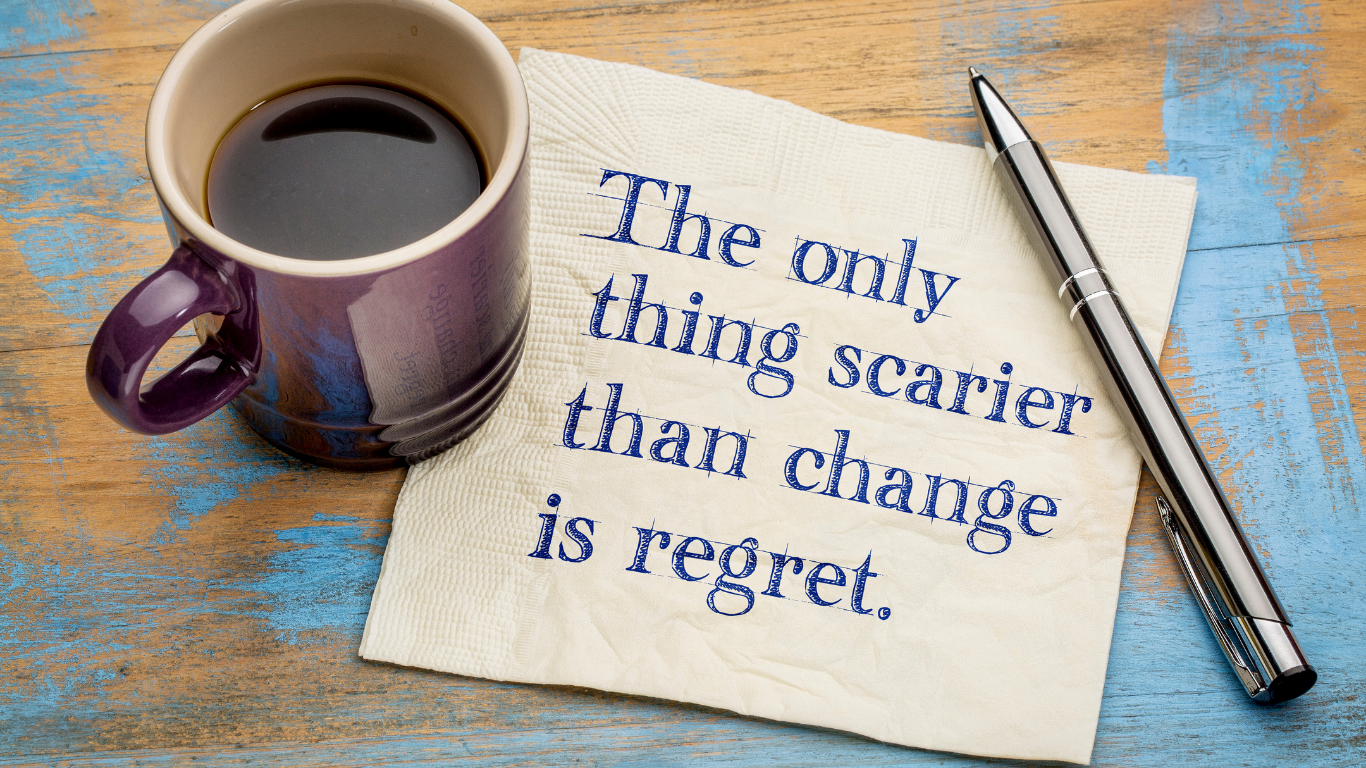Table of Contents
“The saddest summary of life contains three descriptions: could have, might have, and should have.” ~ Unknown
REGRET…This quote shows how many people feel regret when they look back on their lives and see the chances they missed or decisions they made that they now wish they could change.
The phrases “could have,” “might have,” and “should have” all refer to actions that a person could or should have taken but did not, usually due to fear, indecision, or a lack of self-confidence. In this context, all three of these phrases are interchangeable.
When we reflect on our lives and consider the things, we should have done but didn’t, we may feel melancholy or disappointed.
This is because we become aware that we passed up an opportunity that could have provided us with pleasure or satisfaction. We often feel more regret because we can’t change what we did in the past because we can’t go back in time and do things differently.
Nonetheless, it is critical to remember that we still have the ability to make positive changes in our lives in the future.
We don’t need to dwell on past mistakes; instead, we should focus on the here and now and take actions that are consistent with our ideals and objectives
. If we act in this manner, we can create a life that is more in line with our goals, which will also reduce the likelihood that we will feel regret in the future.
What exactly is regret?
Regret is a bad feeling we have when we feel sorry or disappointed about something we did or chose in the past.
We feel sorrow or disappointment when we believe that we could have done something differently and that a different action or decision would have resulted in a more desirable outcome.
This happens when we believe that by changing our actions or decisions, we could have changed the outcome of a situation. It is common to have feelings of guilt, shame, or sadness in addition to regret.
There are numerous factors that can lead to regret, and a variety of circumstances can cause those feelings to arise.
It could be the result of missed opportunities, bad decisions, strained relationships, or any other situation in which we believe we could have acted differently or made better choices.
It could also be the result of any situation in which we believe we could have handled things differently.
Regret can be a painful feeling, but it can also be a useful tool for personal growth and development. By reflecting on our previous actions and decisions, we can gain insight into how we could have done things differently and, as a result, make better decisions in the future.
But if we let ourselves get caught up in our past mistakes and let them control us, it can be hard to enjoy the here and now and keep us from moving forward in a good way.
It is important to find a balance between admitting our mistakes and learning from them, on the one hand, and living in the present and working toward a better future for ourselves, on the other.

What kinds of daily activities can aid in getting over regret?
The following are some activities you can do to improve your ability to live your life without regret:
1. Speak up for yourself and others, and don’t let anyone or anything stand in your way of reaching your goals.
2. Be yourself at all times and learn to love the person you are right now.
3. Rather than standing on the sidelines, actively participate in your life.
4. Invest as much time as possible in activities that bring you joy.
5. Make a list of your goals and then work through them methodically to achieve each one. When things become difficult, you should not give up.
6. Make an effort to do something every day that will make you feel good about yourself; perform random acts of kindness whenever possible.
7. Never give up making progress in the right direction.
8. Accept the fact that it’s okay to make mistakes. Simply remember to learn from your mistakes, forgive yourself, and move on.
9. Prioritize your own health and well-being, and make it a habit to look after yourself first so that you can help others when they need it.
10. Take your own path rather than the one that others want you to take.
11. Find the humor in everyday situations and laugh like there’s no tomorrow.
12. Let go of your fear of change and learn to let go of your worries and go with the flow of life.
13. Try new things and be more willing to put yourself in dangerous situations.
14. Demonstrate increased intellectual curiosity and openness to creative expression.
15. Set a goal of finding happiness in the company of as many different people as possible.
16. Instead of allowing other people’s ideas and perspectives to heavily influence you, think for yourself.
17. Try not to judge people before you get to know them.
18. Instead of focusing on what you don’t have right now, express gratitude for what you do have.
19. Make an effort to admire without being envious of everyone and everything.
20. Instead of hoarding your joy, share it with those around you and stop hoarding it.
21. Instead of attempting to change someone, accept them as they are in the present moment.
22. Instead of focusing solely on the destination, enjoy the journey itself.
23. Recognize that pursuing happiness is more important than accumulating wealth.
24. Keep your negative thoughts under control so they don’t affect how your life turns out.
25. Make effective use of the energy you have available because it is pointless to complain, worry, or act impatiently when that energy could have been put to better use.
26. Be daring. Find the courage to change what needs to be changed while acknowledging that some things simply cannot be changed.
27. Take pride in your work. Determine what it is that you would enjoy doing if you weren’t doing what you’re doing now, and then take the first step toward making that life a reality.
28. Turn your dissatisfaction into a puzzle and have fun attempting to solve it.
29. Consider problems from a variety of perspectives in order to find solutions.
30. Become independent by accepting that we all depend on each other on this planet.
31. Shift your perspective by broadening the scope of what you’re looking at.
32. Don’t waste your time trying to win over people who always say bad things about you.
33. Mold yourself into the kind of person you’d want to spend the remainder of your life with.
34. Always be honest with yourself and others by saying exactly what is on your mind and acting on it.
35. Always show compassion and respect for others.
36. To truly experience life, one must learn to love the present moment and be mindful of both one’s thoughts and actions. Keep a positive attitude and dazzle others with your eloquence.
37. Make every effort to avoid deferring tasks until later.
38. Never, ever hold grudges.
39. Face your fears head-on and try things that you think you’ll never be able to do.
40. Spend time with people who make you happy while also acknowledging that your own happiness is not dependent on the happiness of others.
Even though there appear to be many tasks on this list for you to complete, the truth is that you can complete quite a few of them by focusing on just one of them. For example, right now, as I type this, I’m putting at least 25 different things into practice.

What are the positive aspects of feeling regret?
Although we typically think of regret as a negative emotion, there are times when it can be beneficial. The following are some of the benefits of feeling regret:
- Learning Opportunities: Because of the things we regret, we might be able to learn something important. When we take the time to reflect on our past actions and decisions, we can see where we went wrong and how we can improve in the future. As a result, we will be better equipped to make decisions in the future and will grow as individuals.
- Motivating Elements: Regret is a powerful motivator for people to make changes. It is possible that the experience of regret over past actions or choices will motivate us to act and make positive changes in our lives. This can lead to personal growth, better relationships, and an overall improvement in one’s quality of life.
- Empathy Capacity Increased: The experience of regret can aid in the development of our capacity for empathy toward others. When we feel regret, we gain a better understanding of the impact our actions have on others, and we become more sensitive to the feelings and perspectives of those around us.
- Enhancement of Decision-Making Skills: The experience of regret can help us become better decision-makers. We can improve the quality of our future choices by becoming more thoughtful and deliberate as a result of reflecting on our previous decisions and the consequences of those decisions.
- Gratitude and Appreciation: By reflecting on the things we regret, we can learn to appreciate the positive aspects of our lives. We open ourselves up to the possibility of recognizing and appreciating the positive aspects of our lives when we take the time to think about the things we don’t want to happen again.
- Enhanced Self-Awareness: One advantage of feeling regret is that it can make us more aware of ourselves. If we take the time to reflect on our past choices and actions, we can gain a better understanding of our core beliefs, our values, and what motivates us.
- Increased Resilience: Reflecting on our mistakes in the past can help us become more resilient. If we admit our mistakes, learn from them, and then move on, we can build the inner strength and resilience we need to face the challenges that lie ahead.
- Relationship Improvements: The experience of regret can have a positive effect on the relationships we have with other people. If we are willing to accept responsibility for our actions and make amends for past mistakes, we can improve our relationships and earn the trust of those around us.
- Emotional Intelligence: Enhancement Regret has the potential to increase our emotional intelligence. We can improve our emotional awareness and intelligence by reflecting on our feelings and understanding how they influence the decisions we make.
- Greater Appreciation for Life: Reflecting on mistakes we’ve made can help us appreciate the value of our lives. By first realizing that we will die and that time goes by quickly, we can develop a deeper appreciation for the here and now and live our lives with a stronger focus on the present.
- Improved Problem-Solving Skills: Regret can help us improve our problem-solving abilities. We can devise more efficient methods of resolving future issues by conducting an in-depth examination of the links between the choices we’ve made in the past and the outcomes they’ve produced.
- Increased Courage: Looking back on past mistakes may inspire us to be more courageous. We can develop the courage and confidence to take risks and pursue our goals if we confront our regrets and work to overcome them.
- Increased Creativity: Regret has the power to jumpstart our creative juices. When we take the time to reflect on our past mistakes and the valuable lessons we’ve learned, we can come up with new and original solutions to the problems we face in life.

Last Words for “Regret” in general
In general, regret is a hard emotion to feel, but it can also lead to opportunities that help us grow and develop as people. We can make positive changes in our lives and become better versions of ourselves if we use regret as a learning tool and a source of motivation.
Put these things into action, and then see where life takes you without looking back with regret. Also, please leave a comment below. I’d be very interested to hear your thoughts on this.
https://www.quora.com/?time=1681383031630812&uid=1992540444&unh=c5cebd574a5252671b9e2e2707db8477
Ultimate Worry Guide For Letting Go: 4 Practices + More
Letting Go Emotional Pain! 90 Methods To Ease Emotional Pain
quotes in our website: https://psytify.com/quotes/
More quote resources: https://en.wikiquote.org/wiki/Main_Page

Read more book summaries: “If a human has no direction, every wind is a fresh breeze” ― lenfantvivant
“Thought is only an abstraction representing a fraction of what is.” ― Lenfantvivant
”Widen The Window”(2019) Book Summary
Summary of “Atomic Habits” (2018)

